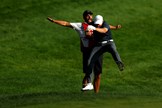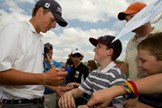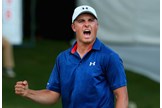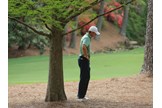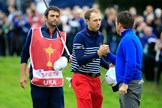Jordan Spieth: The toughest mind in golf?
Last updated:
Jordan Spieth’s incredible rise to become one of the World’s best has been characterised by his remarkable mental strength.
How else could you describe what he did from the 14th hole onwards at Royal Birkdale? He’d already blown a three shot lead when he was standing on the practice range over 100 yards right of the 13th fairway looking more like an orienteerer than a golfer. He escaped with a bogey, but that put him four-over for his round and one shot back off new leader Matt Kuchar with five to play.
Noone could have predicted he would set the final five-hole scoring record for an Open Championship with a birdie-eagle-birdie-birdie-par finish, but that’s exactly what he did. While the leaderboard will show he won by three shots with a final-round one-under 69, the true story is far more about the gritty determined mind of Jordan Spieth who dug his round out of the pit of despair, stunning crowds and journalists alike to win his third major.
Related Stories
Jordan Spieth’s incredible comeback victory
Jordan Spieth’s Open win: As it happened
Open win adds to Spieth’s crazy list of career achievements
WITB: Jordan Spieth
There are stats that tell us who hits the ball furthest, closest to the pin and holes the most putts, but there’s another vital part of golfing success that’s far more difficult to measure. There’s no ranking for mental stength – but if there was, it’s safe to say Jordan Spieth would be right at the top of it.
At just 23 years old, the three-time major winner has already devloped one of the strongest minds in the game. While he may not overpower courses like Dustin Johnson or Rory McIlroy, his incredible mind has helped him to 11 PGA tour titles and a list of enviable records comparable with the greatest in the game.
“Spieth is an exception to just about every rule in that he combines a one in a million natural talent with an incredibly mature head and grounded personality,” says top mental performance coach and author of ‘Silent Mind Golf’, Robin Sieger.
“A lot of this is down to his parents, who deserve a lot of credit for bringing him up the right way, and his sister, Ellie, who was born with a neurological disorder. Her condition and friendship has boosted his maturity and helped to keep him grounded.”
We underpin the ten crucial moments which have prove the remarkable mental strength of Jordan Spieth on his way to his Open victory at Royal Birkdale.
Leaving College Mid-Way Through His Course
Spieth won three tournamenst and was the key player as the University of Texas golf team claimed the NCAA Championship title during his first year at college. He won 2 and half points from three matches at the 2011 Walker cup and was top of the Amateur World Rankings midway through his second year at college when he decided to turn pro – aged just 19. It was called a risky move by some observers because he had no status on the Web. Com or PGA Tours.
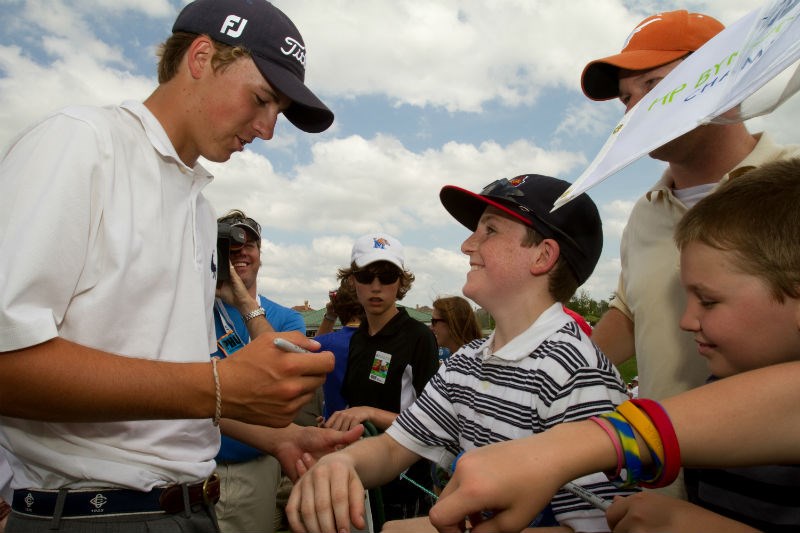
“There were some voices, especially because I didn’t have status anywhere, but I just kind of threw them out,” said Spieth. “I didn’t listen to them then and I never looked back. I knew that through sponsors exemptions I would have enough opportunities to start strong and take care of things by myself”
Sieger says: “He was ready for a bigger stage and he knew it. He had a history of winning and believed he was prepared to win at the highest level. He understood being a top amateur doesn’t really have a bearing on your professional career and he recognised that the PGA Tour was the only real option for him. He’s also very goal oriented and he had the self-belief, commitment and determination to set lofty goals and pursue them at a young age.”
His Crucial First PGA Tour Win… In Dramatic Fashion
Despite the doubts as he joined the paid ranks, Spieth turned out to be an immediate revelation in the professional arena, finishing 2nd in his third event and 7th in his fourth start to gain special temporary membership of the PGA Tour. It was a stunning introduction to the pro game, but if he wanted full PGA Tour membership he needed to win.
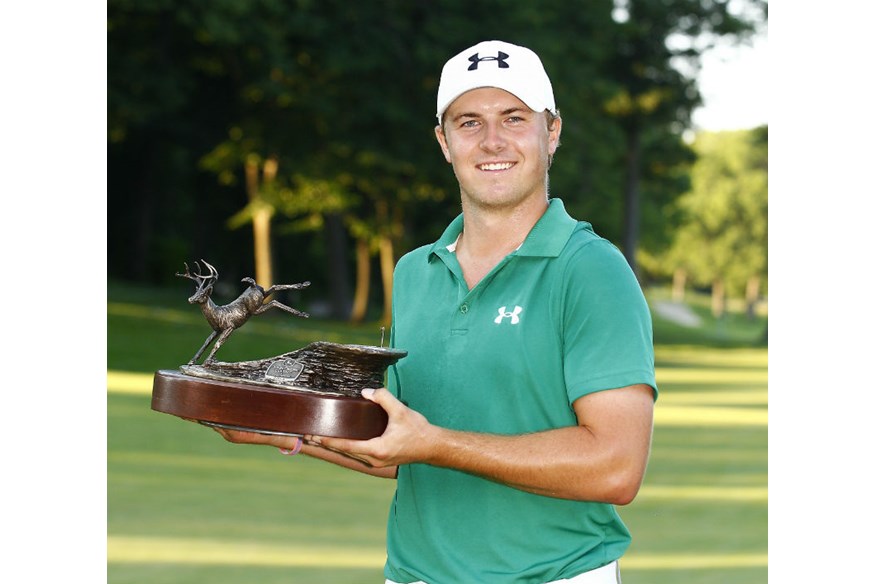
Opportunity knocked at the 2013 John Deere Classic, but sealing the deal was by no means straightforward. The young star knew he had to hole his greenside bunker shot on the 72nd hole to have a chance of getting into a play-off. Cometh the hour, cometh the Jordan. “It took the perfect bounce and somehow went in,” recalls Spieth. “I couldn’t tell you how or why.”
Sieger says: “People mistake mental strength for the ability to endure pain or the ability to concentrate for hours on end, but that is not mental strength. Mental strength is the ability to focus and not be distracted from what you need to do. Some people call it ‘going into the zone’, and if you look at all the great champions they have the ability to make time stand still and give their entire focus to what they need to do.”
“Make no mistake, the fact Spieth’s bunker shot went in was random, as he’d probably only hole one or two in 20 attempts from that bunker, but he believed he could do it and this put him in the best position to give himself a chance of success.”
Blowing Leads In The 2014 Masters and Players
First, the Masters and Players didn’t know what had hit them. Then, Spieth didn’t know what had hit him. In 2014, on debut in both events, the 20-year- old had the lead with 11 holes to play in the year’s first major and 14 holes to play in the game’s ‘ fth major’. From there, he played the final 11 holes at Augusta in three-over to finish three behind Bubba Watson, and fell apart even more dramatically at the Players.
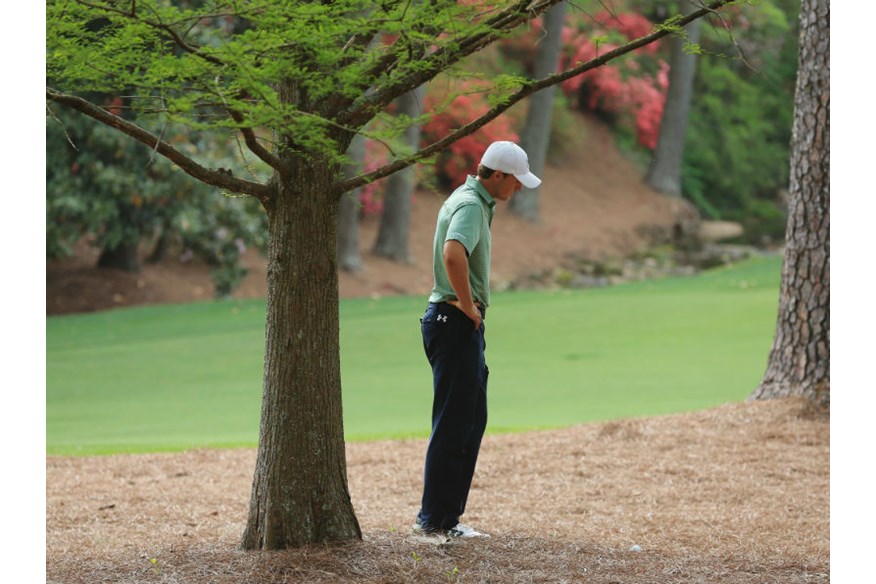
“Right now it really, really stings,” admitted Spieth after his final round at Sawgrass. “But almost everything is positive. One day, I think I’ll look back and laugh at these moments.”
Sieger says: “You’ve got to learn how to lose before you can learn how to win. It’s all down to pressure. To win the biggest titles you need to be comfortable under pressure, but until you are under real pressure you don’t know how you will react. Most people don’t react well under extreme pressure for the first time and Spieth and Rory McIlroy, who blew at the 2011 Masters, are proof of this.
“But where McIlroy and Spieth differ from most is that instead of ruminating on these failures, they learn from them, and don’t repeat them the next time. McIlroy won his next major and Spieth won his next Masters.”
Making His Ryder Cup Debut In A Beaten Cause
Talk about a baptism of fire. On the first morning of the 2014 Ryder Cup, Spieth and his partner Patrick Reed found themselves in a Scottish cauldron when they faced European talisman Ian Poulter and local hero Stephen Gallacher. It was a match that would have intimidated even the most grizzled of Ryder Cup competitors, so how would a 21-year-old rookie react? Simple. He took it in his stride and raised the stakes.
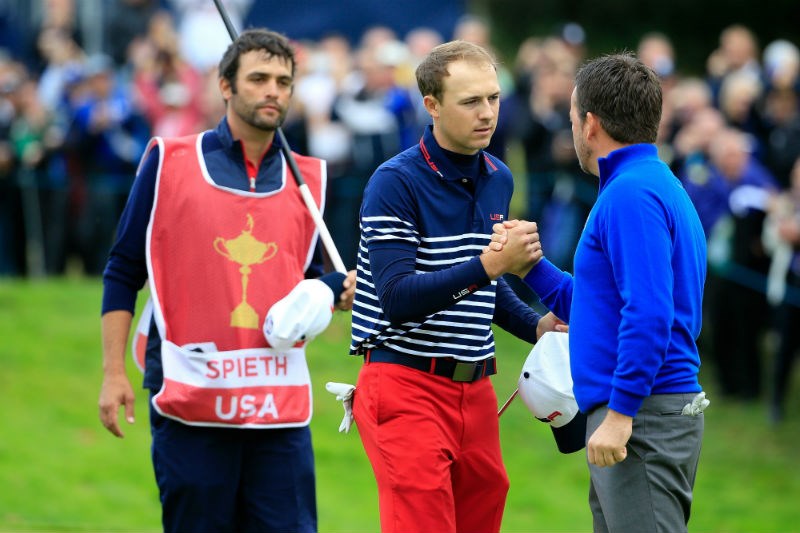
“I don’t think you could have picked out two people that we want to play against more,” smiled Spieth. “Our match is very important. I feel like our job is to win a point and really lower their team morale.” Spieth and Reed humbled Poulter and Gallacher 5&4, before going on to beat Thomas Bjorn and Martin Kaymer and half with Kaymer and Justin Rose on day two.
Sieger says: “If you want to be successful, you need to have great trust in your ability and Spieth definitely possesses this trait. No matter how pressure- filled the situation, he is con dent that he can win. His Ryder Cup debut was a great example of this. He and Reed both truly believed they could win on golf’s biggest stage and this con dence enabled them to form a fantastic team that went out and did just that.”
Dominating The Hero World Challenge
Spieth won over $4million and accumulated eight top 10s during the 2013/14 PGA Tour season, but he didn’t win. And in the world we live in today, this inevitably meant that people began to doubt the credentials of this previously fast- rising star. Maybe he was good, but not great – a journeyman rather than a star? Yeah, right.
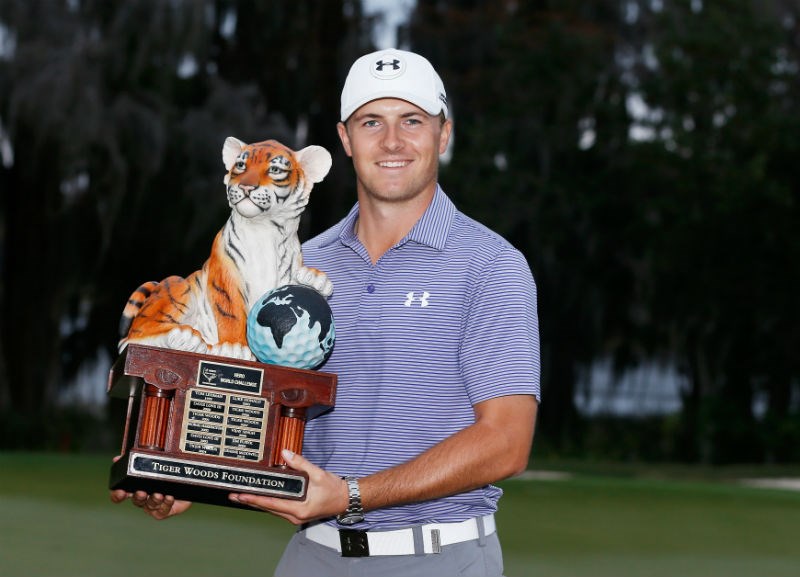
He began to make his doubters eat their words when he shot a final- round 63 to win the 2014 Australian Open by six shots in late November, and he ensured they ingested every syllable when he lapped a top-class field to win the 2014 Hero World Challenge by 10 shots in early December. “I have had some struggles towards the top of the leaderboard on Sundays,” admitted Spieth. “I needed a new level of patience and we found the solution as a team.”
Sieger says: “Spieth winning by 10 shots is like Usain Bolt winning the 100m by a second. It was such a good performance and it showed the rest of the eld that he was someone with a lot of natural talent who wasn’t fazed by the quality of a eld or the size of a big lead. That kind of performance says: ‘I’m not searching for answers like other players, I’m happy that nothing is missing from my game’. And that message tells your rivals that you are expecting to win every competition you enter.”
Leading From The Front At The 2015 Masters
Could Spieth bounce back from his Augusta heartbreak in 2014 at the very next Masters tournament? You bet he could. The youngster seized the lead with an opening-round 64 and never looked back. By the time the sun had set on Sunday evening, he had made a record 28 birdies and carded a record- equalling 18-under 72-hole total to secure his first major title and become the youngest Masters winner since Tiger Woods in 1997.
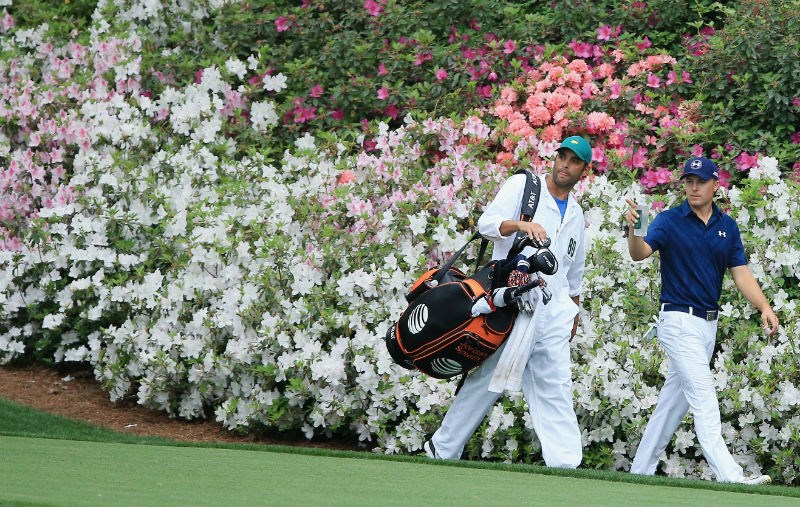
It was a performance of rare composure and certainty, especially for someone trying to win their first major. “It’s incredible, arguably the greatest day of my life,” smiled Spieth. “I’m just really, really pleased with the whole week. Being out on top, being able to stay on top and conquering my favourite tournament in the world.”
Sieger says: “Leading any tournament from wire-to-wire is di cult, and leading a major for all four days is even tougher. Being at the top of the leaderboard exposes you to constant pressure, which can exhaust players who don’t know how to relax. Spieth didn’t get exhausted at Augusta because, like all the greats, he’s able to relax away from the course and take himself in and out of the zone on the course.”
“It’s impossible to concentrate for every minute of a four or five-hour round, so you need to develop a strategy that allows you to concentrate over your shots and decompress in between times. Spieth has proved he knows exactly how to do this.”
Bouncing Back At The 2015 US Open
Ten weeks after his Masters triumph Spieth was back at the top end of a major leaderboard. This time he was attempting to become the youngest US Open winner since Bobby Jones in 1923, and this time things did not go entirely his way. On the 71st hole he had a three-shot lead, but stumbled to a double-bogey that was as surprising to us as it will have been frustrating for Spieth. And when coupled with a Dustin Johnson birdie, appeared to wreck his chances of success.
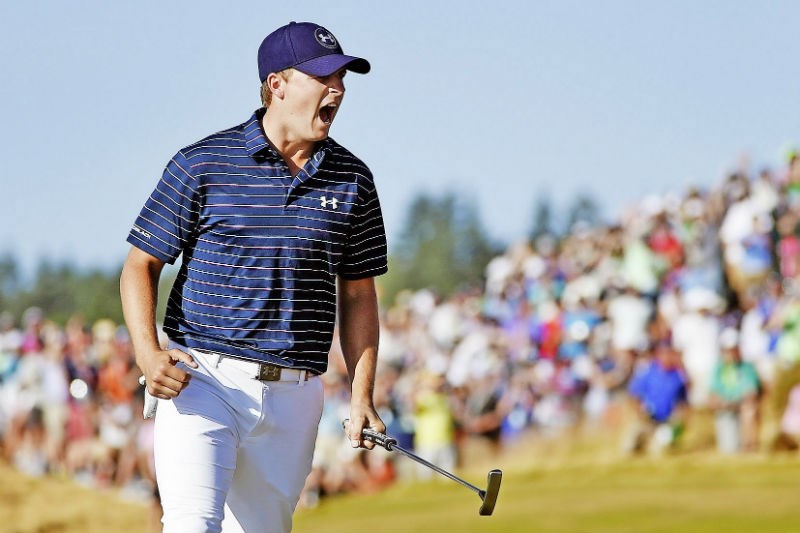
It was heartbreaking, yet somehow the 21-year- old picked himself off the floor and made what turned out to be a winning birdie on the 72nd hole. “I didn’t think I had lost it after 17,” reveals Spieth. “But I did think I needed to play 18 well to give myself a chance of making a play-off”
What you can learn from this: “A lot golfers would have gone into a spiral of negativity when they double- bogeyed the 71st hole. They would make themselves a victim and if you do that it is very difficult to come back and play a good next hole.”
“Instead of doing this, Spieth did what he always does, which is display a very strong capacity to exist in the present. Over the ball, he does not think about what went on 30 seconds ago or what could happen 30 seconds in the future. He stays in the moment and it enables him to forget about a disappointing hole and focus on the task at hand.”
Overcoming Masters Collapse To Win Dean & Deluca
Throwing away a five-shot lead on the back-nine at Augusta in 2016 was a tough one to swallow. He had been completely in control for the third consecutive year until he reached the 12th hole, and he was as shocked as the rest of us when he put his ball in the water twice on the same hole for a quadruple bogey. Spieth lost by three shots as he failed to recover, resulting in one of the biggest major collapses in history that led him to take a month off. Could Spieth recover from such heartache? Of course he could.
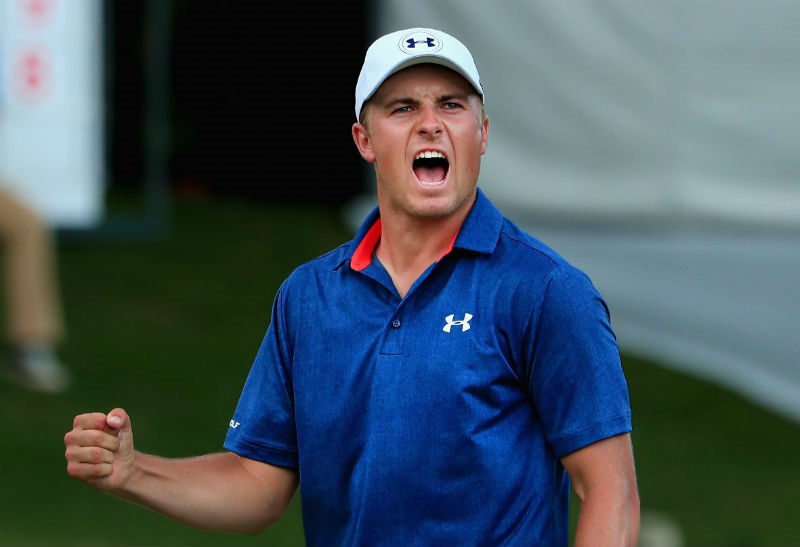
Just three months later he was back in the winners circle. His final-round 65 at the Dean & Deluca gave him a three shot victory in his home state over Harris English, proving he has an un-matchable mental fortitude.
“That’s a tough hump to get over, coming back from Augusta and to do it in our third tournament back,” Spieth said of his win.
More telling was how he coped with his back-nine collapse at The Masters. “I’m not taking it very hard,” he told the media. “I’ve got ladies at the grocery stores putting their hand on me and going, “Really praying for you. How are you doing?” I’m like, ‘My dog didn’t die. I’ll be OK. I’ll survive.’ It happens.”
What you can learn from this: There are PGA Tour journeymen who only win once in their careers after coming close numerous times, and there are many more who would fall apart mentally after a collapse like his at The Masters – but not Spieth.
He didn’t let it rule his life. Instead, he regrouped and took the next tournament as he always does – by living in the exact moment and taking it shot by shot. To comeback from something like that to win just three tournaments later is a credit to how he copes with and overcomes huge disappointments. Many would have become nervous during the back nine with a chance to win, but Spieth had no past-demons to contend with and instead birdied all three of his final holes to win.
Reaching 10th PGA Tour Title In Dramatic Fashion At Travelers Championship
Sinking a green-side bunker shot in a play-off to win your 10th PGA Tour title in a carbon coby of the way you got in to the play-off to win your first? Jordan Spieth couldn’t have written it any better, but it was not as easy as the wire-to-wire victory would suggest. For the first time is his life on his way to victory, the putter- a club so crucial to all of his previous titles – went cold.
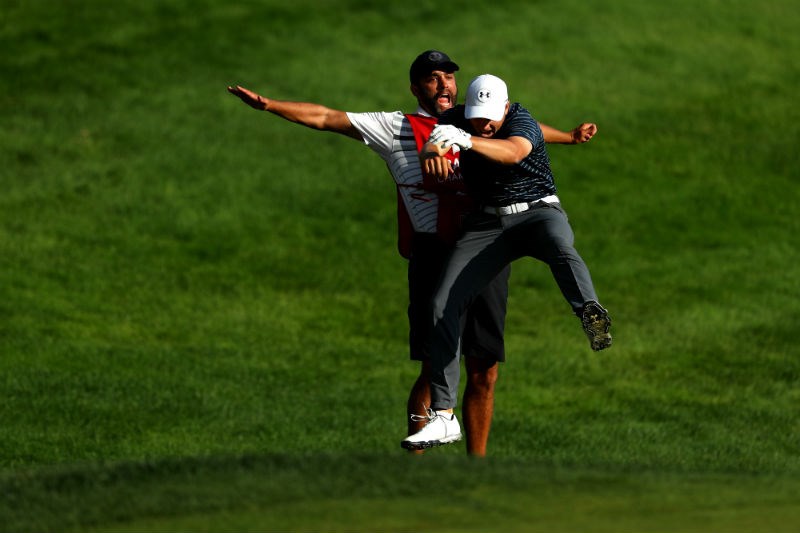
With missed chances on the greens leading to dropped shots on the 12th and 14th holes, Spieth fell back in to a share of the lead with Daniel Berger for the first time. Although he picked up a shot on 15, Berger birdied 17. Spieth needed a birdie to win or a par to force the play-off on 18, but it looked a difficult job as he found the green-side bunker with his second. He saved the up and down, but found the very same position in the bunker on the first play-off hole – which would have flustered anyone but Jordan Spieth.
Justin Thomas took to twitter to say “It wouldn’t surprise me if he holed this”. And that’s exactly what he did. After sinking one of the greatest shots to close out a potential victory, Spieth knew the title would likely be his, and he turned straight to his caddie Michael Greller and they body-bumped in celebration.
“The putter let me down today. For the bunker shot to go in, that was awesome. I don’t know if I’ll ever have that feeling again. I’m going to enjoy this one for sure,” Spieth said.
What you can learn from this: Spieth had lost one of the most vital pieces of armoury in his bag when his putter wasn’t performing how he is used to, but he still rallied after losing his lead to bring out a championship-winning shot in a high pressure situation.
Most people would have panicked, but even though he was at a distinct disadvantage being in that bunker, his self-belief in what he can produce even when he looks out of it is the reason he managed to become the second youngest player in history to reach 10 PGA Tour titles.
Winning The Open After A Horror Start
Even Jordan Spieth admitted that he let himself wonder if he was going to have ‘to go through this again’ when he was three-over par for his round at the ninth and tied for the lead with Matt Kuchar during the final round.

He’d been solid the rest of the week with all three rounds in the 60s to put himself three clear with a chance of winning his third major title to beat even Tiger Woods to three legs of the grand slam before the age of 24.
And then he pushed it so far right on the 13th tee that the collapse looked complete – but what looked like a shot that would lose him the tournament probably ended up winning it. Over 20 minutes of time was spent moving crowds and working out where he could take his penalty to drop the ball when they ended up deciding on the practice range. He escape with a remarkable bogey and his caddie Michael Greller told him – ‘this is the momentum shifter’.
Almost getting a hole in one on the next was followed by huge putts (55 feet for eagle, 25 feet for birdie), and suddenly he was unbeatable. One more birdie on the 17th gave him a two-shot lead heading up 18, and a tap in par was all he needed to set three Birkdale scoring records secure his place in the majors history books.
“I have no idea how I shot one-under today,” Spieth said. “This is one of the most sought after trophies in the world, and to have my name on it is just a dream come true”
What we you can learn from this: There is a quality that Jordan Spieth possesses in his mental armoury that allows him never to discount himself from victory – even when he can’t putt or can’t keep his driver at least within 100 yards of the fairway.
His ability to once again forget every dropped shot or the fact he’d squandered a three shot lead to recover five shots in four holes is something only the mentally strongest player could achieve. To be a multiple major champion you have to be able to handle the toughest pressure imagineable, and Spieth’s victory and mental grit is something every player on the planet will be jealous of.
What is true is that he credits his caddie Michael Greller as being a huge part in helping calm his mind and regain focus during both of his last two victories… but he is still the one hitting the shots and holing the putts when it really matters.


